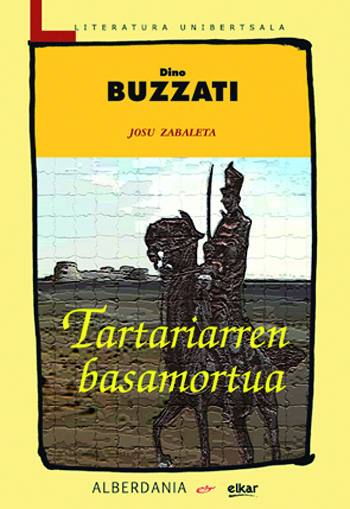
No harmony, please.
- Dino Buzzati. (Translation: Josu Zabaleta)::The Tartar Desert self-production Alberdania-Elkar pages ::302 price:: €15.50
Saioa Ruiz Gonzalez
2011ko urriaren 05

Tartariarren basamortua
“The novel The Tartar Desert by Dino Buzzati leaves no one indifferent.” Thus says Josu Zabaleta, translating the work of the Italian writer into the Basque language, in the foreword to this achieved translation he gives us. It's a hard novel, one that drowns you as you go through the pages, but you can't leave. Here you don't see a trait of war or blood, what for? There is no need from Buzza. It was enough to place man, or men, in a desert, walled space, for the reader to reflect with his fears, with his history or his thoughts, on the irretrievable time that escapes.
Giovani Maco spends the days, the months, the seasons of the year, since Bastiani reached the Fortress, observing a desolate and eternal landscape, waiting for the enemy to reach the horizon. The rigidity of military standards, the noise of the pit behind the wall and the night sounds of the shoes have become something desirable in this daily solitude of Narcotics. His life is getting worn out in anticipation of a great event that will never come. Where have the times of youth been filled with adventures, loves, friends, irresponsible moments? The
writer focuses our attention on the desert surrounding the Bastiani Fort, as the character is not able to identify his image on the island. The area of missed opportunities, the void, the lifelessness opens before it, but it is not visible.
We perceive the idea of the eternal circle, Drugs takes the succession of those who, like him, spent their whole life in the fortress, as those who come later will occupy their place in a continuous circle.
How many of you have noticed that you spend your days looking at life, following a steady pace of run-run-run? We live under a music that comes from outside of us, which at first is odious, but which, at last, we assume with total automatism. We gradually became instruments of the orchestra, ceasing to hear the notes, until the director orders it to stop playing. But the order will not come from outside, just as the wheel cannot be suspended and as the great event that will change Edurne’s life will not come. Change has to produce itself, without falling into the harmonic melody between your life and your external rhythm.
Let's open our eyes and hold our ears. If we're not able to recognize the desert and challenge, it's a sign that we're sold. For those moments, as a solution, I recommend the Tartar Desert of Dino Buzzati.
Giovani Maco spends the days, the months, the seasons of the year, since Bastiani reached the Fortress, observing a desolate and eternal landscape, waiting for the enemy to reach the horizon. The rigidity of military standards, the noise of the pit behind the wall and the night sounds of the shoes have become something desirable in this daily solitude of Narcotics. His life is getting worn out in anticipation of a great event that will never come. Where have the times of youth been filled with adventures, loves, friends, irresponsible moments? The
writer focuses our attention on the desert surrounding the Bastiani Fort, as the character is not able to identify his image on the island. The area of missed opportunities, the void, the lifelessness opens before it, but it is not visible.
We perceive the idea of the eternal circle, Drugs takes the succession of those who, like him, spent their whole life in the fortress, as those who come later will occupy their place in a continuous circle.
How many of you have noticed that you spend your days looking at life, following a steady pace of run-run-run? We live under a music that comes from outside of us, which at first is odious, but which, at last, we assume with total automatism. We gradually became instruments of the orchestra, ceasing to hear the notes, until the director orders it to stop playing. But the order will not come from outside, just as the wheel cannot be suspended and as the great event that will change Edurne’s life will not come. Change has to produce itself, without falling into the harmonic melody between your life and your external rhythm.
Let's open our eyes and hold our ears. If we're not able to recognize the desert and challenge, it's a sign that we're sold. For those moments, as a solution, I recommend the Tartar Desert of Dino Buzzati.